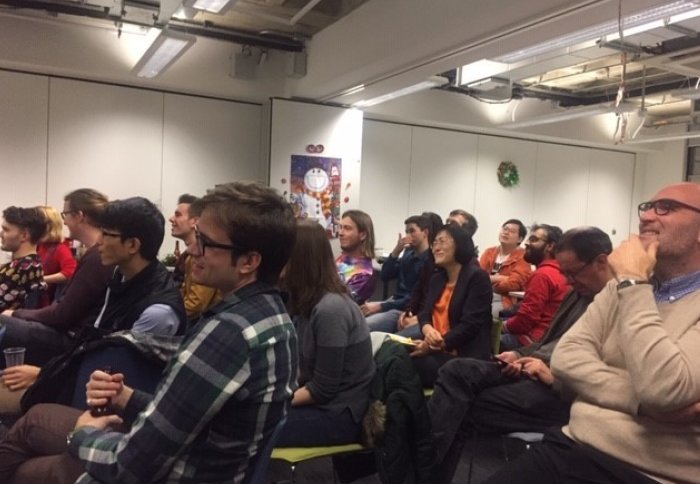Students past and present get together for the annual PE-CDT Christmas party
by Lisa Bushby

Listening to the alumni talks
Drinks, curry and merriment followed a night of prize giving and alumni talks.
The Plastic Electronics Centre for Doctoral Training trains doctorial students at Imperial College, Oxford University and Queen Mary University of London in this exciting, fast-moving and interdisciplinary field. Students progress through the programme as a cohort, supporting and learning from each other.
Alumni talks
The strength of inter- and intra-cohort relationships was clearly evident at the festive event, as four PE-CDT alumni joined the party and gave short talks offering advice to current students on writing up, finding a fellowship, moving beyond academia and making the most of the PE-CDT programme.
Dr Phil Calado, now a post-doc at Imperial gave the first talk and reminded students to seek support if things aren't going well - there are many avenues open to students, including the CDT mentor who is there to help. When it comes to finding a position as a post-doc, he advised "do your research on potential supervisors", attend conferences and schools and get comfortable with public speaking. He was followed to the rostrum by the newest Dr to the alumni family, Prospero Taroni Junior, who had passed his PhD viva earlier that week. (Congratulations Prospero!) Prospero's entertaining presentation had everyone laughing as he "doesn't take himself too seriously" and showed a series of photos proving that he thoroughly enjoyed the cohort-building events! He took the time to write up, while he managed a job "keep yourself motivated and allow time for writing your thesis", he advises.
Dr Alex Giovanitti, who is leaving Imperial at the end of 2018 to start a fellowship at Stanford University, shared his insights into how to get a fellowship position post-PhD. If you want to do a post-doc, he suggests, try to secure your own funding. Alex had won the EPSRC Doctoral Prize Fellowship following his PhD enabling to remain at Imperial working for Jenny Nelson. His tips include: "Get in touch with future PIs, meet at conferences, offer to present your work to their group/meet at their institutions".
Finally, Dr Barnaby Walker. Now a botanist/data analyst at Kew Gardens, he was previously working on flow reactors, so quite a change! He encouraged students to consider the range of options open to them post-PhD: "You don't have to do research on what your PhD is on, nor do you have to stay in academia" and urged students to apply for posts they find interesting "even if you don't feel you are fully qualified."

Prize giving
The alumni talks were followed by a prize-giving ceremony.
Demetris Soukeras won a prize for outstanding leadership; Alice Walker won for championing cohort building. Helen Bristow and Katie Stewart won two awards each - for outstanding achievement on the MRes course (Helen), outstanding achievement award for research (Katie) and both received an additional award for their work supporting events, for which Jack Herrington also received a prize.
Prizes were £30 amazon vouchers and £250 cash for the outstanding MRes achievement and research awards.

Inaugural Student Choice Awards
The inaugural Student Choice Awards gave students the opportunity to recognise outstanding members of staff. Each winner was presented with a personalised mug and certificate.
- Lisa Cheung won the prize for Outstanding Pastoral Care
- The prize for best supervision went jointly to Martin Heeney and Moritz Reide.
- The prize for excellence in teaching went to "hopping to teaching excellence" star Jenny Nelson.
Party time!
The night ended with drinks, curry and festivities.
Article text (excluding photos or graphics) © Imperial College London.
Photos and graphics subject to third party copyright used with permission or © Imperial College London.
Reporter
Lisa Bushby
Department of Physics